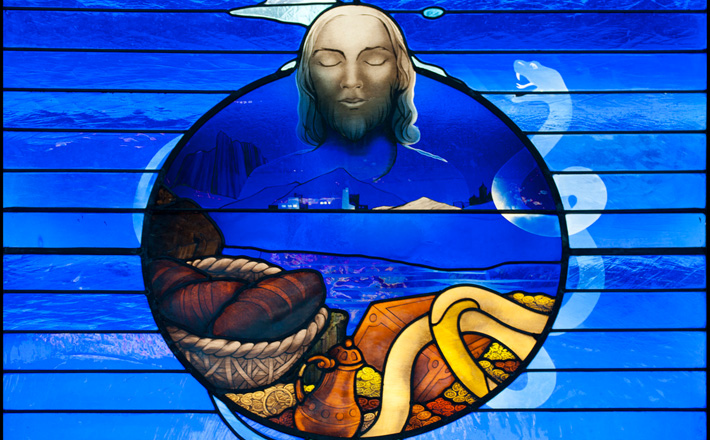Commentary on Matthew 4:1-17
The temptation of Jesus has seemed to spark the human imagination for millennia.
Paintings and stained-glass windows that show Jesus confronted by the devil abound. Take for example Botticelli’s “Three Temptations of Christ” painted on the Sistine Chapel. The more extended scene, recorded in both Matthew and Luke, has also inspired writers, from Milton in Paradise Regained to Dostoevsky’s The Brothers Karamazov. Movies that visualize the life of Jesus routinely choose to portray his temptation in the wilderness, from “The Greatest Story Ever Told,” to “The Temptation of the Christ,” to “The Passion of the Christ.”
Maybe this keen interest comes from a classic portrayal of the struggle between good and evil. Or maybe it’s more personal — maybe we are captivated by the story of someone who, against all odds, beats evil incarnate at its own game. Both of these lenses show up in Matthew’s temptation narrative in Matthew 4:1-11. In context, we’ve just seen the Spirit come upon Jesus to empower his forthcoming ministry (3:16-17). Now, that same Spirit leads Jesus in the wilderness “to be tempted by the devil” (4:1).
Although the tendency has been to read this text as an example of divine willpower overcoming diabolic temptation, Matthew instead highlights the comparison between Jesus and Israel, in their respective wilderness temptations. He does this through a threefold reference to Deuteronomy 6-8, which portrays Moses describing Israel’s wilderness wanderings and their consistent disloyalty to Yahweh, their God. In contrast, Matthew narrates that Jesus, in his wilderness experience (4:1), is fully loyal to Yahweh in the face of significant temptation.
The three temptations focus on the use of Jesus’ Spirit-endowment to produce bread after a forty-day period of fasting (Matthew 4:2-4), tempting God by throwing himself down from the top of the temple (4:5-7), and turning from exclusive loyalty to Yahweh to worshiping the devil (4:8-10). In each case, Jesus draws from Scripture (and Deuteronomy specifically) to diffuse the test and provide the divine perspective on the question at hand.
Even when the devil is portrayed as using Scripture for nefarious purposes, claiming that angels will protect Jesus if he throws himself from the heights of the temple (Psalms 91:11-12 in Matthew 4:6), Jesus is portrayed as true interpreter of the Scriptures. He rightly applies the Torah to his own experience. And once Jesus has withstood every temptation, in a lovely ironic turn, God sends angels to care for him (4:11).
In 4:12-16, Matthew turns from Jesus’ wilderness temptation to his relocation from Nazareth to Capernaum, which will be the hub of Jesus’ Galilean ministry (see 8:5). Matthew provides his own commentary on this move with a quotation from Isaiah 9:1-2, which frames Jesus’ coming ministry in terms of light now dawning for his own people (4:16) and with intimations of Gentile inclusion in the kingdom — “Galilee of the Gentiles” (4:15). This wider inclusion motif is reiterated across Matthew, from the four Gentile references in the opening genealogy (1:3, 5-6) to Jesus’ call to preach to all the nations in the final words of the Gospel (28:19).
The final verse of the assigned text is the pivot between Jesus’ preparation for ministry (Matthew 4:1-16) and Jesus’ Galilean ministry (4:17-16:20). It includes Matthew’s two-fold formula: “From that time Jesus began to … ” (4:17: 16:21) that divides the Gospel narratively into three major sections. In this second section focused on Jesus’ ministry in Galilee, Matthew narrates about the coming near kingdom or reign of God, that John has already announced (3:2) and Jesus’ twelve disciples will be exhorted to preach (10:7). Jesus will both teach about that kingdom (see also chapters 5-7, 13) and embody it in his healings (see also 8:1-9:38) and inclusive meals (see 9:9-13; 11:19).
As we preach the temptation scene, it would be helpful to press against two fairly common misconceptions. The first is the assumption that Jesus only experiences temptation here in Matthew’s story. Instead, we should hear Jesus continuing to be tempted to forego his God-given mission across the storyline of the first Gospel.
From the diabolic temptation uttered by Peter to reject the cross as the endpoint of Jesus’ mission (16:22-23) to the temptations in Gethsemane, at his arrest, and during his crucifixion (26:36-46, 53; 27:40-42), Jesus continues to be pressed to turn aside from his mission. “Matthew does not minimize Jesus’s struggle with temptation; and this ongoing attention to temptation functions to shine the spotlight on Jesus as utterly faithful to God and God’s mission for him” (Brown and Roberts, The Gospel of Matthew, 50).
The second assumption we should avoid is that Jesus overcomes temptation out of his divine nature. Matthew’s emphasis in this passage on Israel Christology — Jesus as faithful representative Israel and so as the true and loyal expression of the people of God — suggests otherwise. In his humanity and through his faithfulness to God through the Spirit’s empowerment, Jesus overcomes temptation. This provides great hope for believers, who can rely on the Holy Spirit and the Scriptures for their strength in the throes of every temptation.
PRAYER OF THE DAY
God of strength, your son Jesus withstood many temptations because his love for you was greater than his earthly desires. Make our love for you so strong, that we might withstand anything that threatens to stand between us and your love. We pray these things in the name of Jesus Christ, our Savior and Lord. Amen.
HYMNS
Light dawns on a weary world ELW 726
Jesus calls us; o’er the tumult ELW 696, H82 549, 550, UMH 398, NCH 171, 172
Is there anybody here who loves my Jesus Traditional Spiritual
CHORAL
He shall give his angels charge over thee, Felix Mendelssohn


January 20, 2019